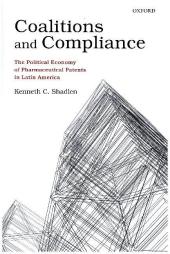 Neuerscheinungen 2017Stand: 2020-02-01 |
Schnellsuche
ISBN/Stichwort/Autor
|
Herderstraße 10
10625 Berlin
Tel.: 030 315 714 16
Fax 030 315 714 14
info@buchspektrum.de |

Kenneth C. Shadlen
Coalitions and Compliance
The Political Economy of Pharmaceutical Patents in Latin America
2017. 320 p. 242 mm
Verlag/Jahr: OXFORD UNIVERSITY PRESS; OUP OXFORD 2017
ISBN: 0-19-959390-6 (0199593906)
Neue ISBN: 978-0-19-959390-3 (9780199593903)
Preis und Lieferzeit: Bitte klicken
Winner of the International Studies Association´s Global Health Studies Section Book Prize!
This book offers systematic comparative analysis of the political economy of pharmaceutical patents in Latin America, and examines the diverse ways that international changes can reconfigure domestic politics.
Coalitions and Compliance examines how international changes can reconfigure domestic politics. Since the late 1980s, developing countries have been subject to intense pressures regarding intellectual property rights. These pressures have been exceptionally controversial in the area of pharmaceuticals. Historically, fearing the economic and social costs of providing private property rights over knowledge, developing countries did not allow drugs to be
patented. Now they must do so, an obligation with significant implications for industrial development and public health. This book analyses different forms of compliance with this new imperative in Latin America, comparing the politics of pharmaceutical patenting in Argentina, Brazil, and Mexico.
Coalitions and Compliance focuses on two periods of patent politics: initial conflicts over how to introduce drug patents, and then subsequent conflicts over how these new patent systems function. In contrast to explanations of national policy choice based on external pressures, domestic institutions, or Presidents´ ideological orientations, this book attributes cross-national and longitudinal variation to the ways that changing social structures constrain or enable political leaders´
strategies to construct and sustain supportive coalitions. The analysis begins with assessment of the relative resources and capabilities of the transnational and national pharmaceutical sectors, and these rival actors´ efforts to attract allies. Emphasis is placed on two ways that social structures are
transformed so as to affect coalition-building possibilities: how exporters fearing the loss of preferential market access may be converted into allies of transnational drug firms, and differential patterns of adjustment among state and societal actors that are inspired by the introduction of new policies. It is within the changing structural conditions produced by these two processes that political leaders build coalitions in support of different forms of compliance.
Shadlen masterfully uses comparative-historical analysis to explain countries´ different reactions to external pressures regarding intellectual property rights. Drawing on substantial original research, he systematically compares a market-preserving patent regime in Argentina, a neo-developmental patent regime in Brazil, and an internationalist patent regime in Mexico. The argument is a triumphant theoretical and substantive success, formulating and applying a convincing analytical framework for understanding diversity in national responses to the new global order in intellectual property rights. James Mahoney, Gordon Fulcher Professor in Decision-Making, Departments of Sociology and Political Science, Northwestern University


